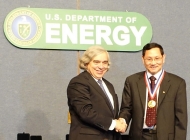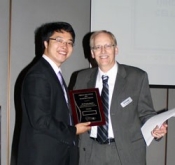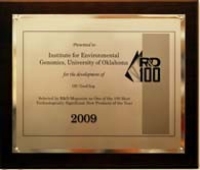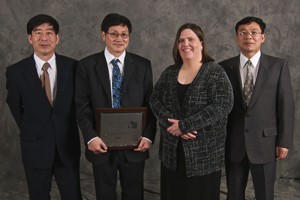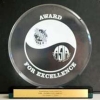December 16, 2020-
New Study Finds OU Research Well Cited, Impactful
According to a recent study published in the journal PLOS Biology, 197 University of Oklahoma researchers are listed as among the most influential researchers in the world. The study was led by Stanford University professor John Loannidis and analyzed the career-long impacts of researchers globally across a broad range of disciplines. The resulting list features the top 100,000 impactful researchers.
An individual’s research productivity and impact are often measured by how frequently others cite their work. However, in his paper, Loannidis challenged measures of research impact primarily based on citation counts. He suggests that norms for different disciplines and sub-disciplines can differ widely, making citation counts like “apples to oranges” when looking across disciplines. Some authors will also cite their own previous research to exaggerate their research impact, or affiliate with “citation farms,” in which a small cluster of authors heavily cite each other.
To address those concerns, the study’s authors published a database that uses a variety of measures to calculate researchers’ impact, including a composite measure of citations that adjusts for influencing factors.
The 197 OU researchers, ranging in fields from engineering, to history, to health sciences, social sciences and many more, are represented among the top researchers in the world based on this composite measure, including career-long research impact and research impact for the year 2019.
“This impressive list of world-leading OU researchers is a clear testament to the research excellence that has been a hallmark of OU throughout its history, and serves as a reminder of what an excellent base we have on which to build the success of the Lead On, University strategic plan,” said Tomás Díaz de la Rubia, OU Norman vice president for research and partnerships.
“This study’s results and database underscore the fact that our researchers are making discoveries that lead to improved health and well-being for people in Oklahoma and beyond,” said James Tomasek, vice president for research at the OU Health Sciences Center, which has campuses in Oklahoma City and Tulsa. “Whether their research projects take place in a laboratory, a hospital or clinic, or in the community, our researchers are among the most dedicated and skilled at what they do.”
The following list of 197 OU researchers, includes current, recently hired, emeritus and deceased OU personnel (view the full database): B. Abbott; Younane N. Abousleiman; Gillian M. Air; Janet K. Allen; Robert E. Anderson; Michael T. Ashby; Mohammed Atiquzzaman; Jessie L.S. Au; Howard Baer; Miguel J. Bagajewicz; E. Baron; Joseph Bastian; T. W. Beck; Debra A. Bemben; Michael G. Bemben; Jeffrey S. Bender; C. W. Bert; Ricardo Betancur-R; Resham Bhattacharya; Howard Bluestein; D. Blume; Mark C. Bolino; Dale W. Bratzler; Eli S. Bridge; Harold E. Brooks; Cecelia Brown; Kathleen Buckwalter; Lowell W. Busenitz; Janalee P. Caldwell; Daniel J.J. Carr; Steven D. Chernausek; Steven G. Chrysant; Robert H. Cichewicz; Richard L. Cifelli; Faruk Civan; Adam J. Clark; P. C. Comp; Paul F. Cook; Michael S. Cookson; Linda D. Cowan; Robert K. Crane; A. Neil Crowson; Anna Csiszar; Madeleine W. Cunningham; Mark Curtis; George L. Dale; Rajiv P. Dant; Paul L. DeAngelis; Michael S. Detamore; Tomas J. Diaz de la Rubia; Danny N. Dhanasekaran; Glenn Dryhurst; Claude E. Duchon; Riley E. Dunlap; David S. Ebert; Louis H. Ederington; Barish H. Edil; Ronald C. Elkins; G. Emanuel; Kevin C. Farmer; Ola M. Fincke; James L. Fleckenstein; Robert D. Foreman; Roger Frech; Jacob E. Friedman; B. M. Fung; Christine Gaylarde; James N. George; Ahmad Ghassemi; S. R. Gollahalli; Nathan A. Goodman; Gary J. Gorbsky; Brian P. Grady; Barbara A. Greene; Ronald A. Greenfield; Ronald L. Halterman; Robert M. Hamm; M. H. Hanigan; Ulrich H. E. Hansmann; Kyle Harper; Ji Hong; Yang Hong; Elaine Hsieh; Warren M. Jackman; Judith A. James; Ralf Janknecht; Michael Kaspari; Jeffrey F. Kelly; Susan Kovats; Lee R. Krumholz; F. C. Lai; Peter Lamb; Paul A. Lawson; Ralph Lazzara; Yun Zheng Le; Fred N. Lee; Karen M. Leighly; Min Li; Douglas K. Lilly; Shaorong Liu; David London; William R. Lovallo; G. T. Lumpkin; Jian xing Ma; Chuanbin Mao; Kurt J. Marfurt; William J. Matthews; Rodger P. McEver; Greg McFarquhar; Michael J. McInerney; Jesus E. Medina; William L. Megginson; William Meyer; David Miller; Kimball A. Milton; Kyung Whan Min; Farrokh Mistree; Shankar Mitra; James W. Mold; Kathleen Moore; Kevin L. Moore; Priyabrata Mukherjee; John J. Mulvihill; Michael Mumford; Juneann W. Murphy; Hiroshi Nakagawa; Ram S. Nanda; Kenneth M. Nicholas; William C. Orr; Dimitrios V. Papavassiliou; Oscar A. Parsons; Samuel L. Perry; Kenneth J. Petersen; Michael W. Pfau; Betty Pfefferbaum; Corey C. Phelps; R. Paul Philp; Chinthalapally V. Rao; Gary E. Raskob; Ze’ev Reches; M. Reichlin; Morris Reichlin; Daniel E. Resasco; Alireza R. Rezaie; Arlan Richardson; Michael B. Richman; George B. Richter-Addo; Malcolm Robinson; Bruce A. Roe; James A. Rosenthal; Elliott D. Ross; Laurence Z. Rubenstein; Scott D. Russell; Alexander Ryzhkov; David Sabatini; Saeed Salehi; Randy A. Sansone; Bayrammurad Saparov; Ingo Schlupp; Francis J. Schmitz; Yihan Shao; Margaret A. Shaffer; Mark Sharfman; Jeremy C. Short; Roger Slatt; Carl Sondergeld; William E. Sonntag; M. Strauss; Heshan Sun; Ira N. Targoff; C. Teodoriu; Udho Thadani; Djebbar Tiab; Rodney K. Tweten; Zoltan Ungvari; Holly Van Remmen; Caryn C. Vaughn; Laurie J. Vitt; Joan Walker; D. Keith Walters; Xuguang Wang; Barry L. Weaver; Lawrence J. Weider; Paul H. Weigel; Robert Wild; Stefan Wilhelm; Mark L. Wolraich; Xiangming Xiao; Ming Xue; Rui Q. Yang; Youngjae You; Linda Zagzebski; Helen I. Zgurskaya; Guifu Zhang; Bin Zheng; Jizhong Zhou; Robert W. Zmud.
Additionally, Jizhong Zhou, the director of the OU Institute for Environmental Genomics and George Lynn Cross Research Professor in the Department of Microbiology and Plant Biology, was also listed among the top 0.1%, of the world’s researchers by the research analytics company, Web of Science. Their 2020 list of highly cited researchers include those most frequently cited over the last decade, fewer than 6,200 scholars across 21 research fields.
This article was originally published by the Office of the Vice President for Research and Partnerships.
Article Published: Wednesday, December 16, 2020
New Study Finds OU Research Well Cited, Impactful

